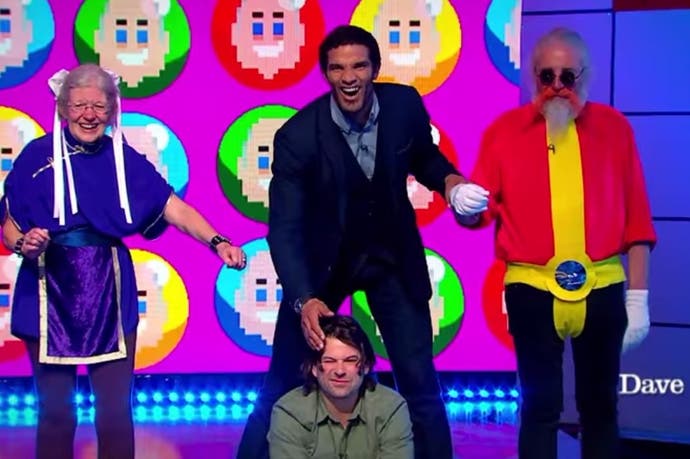The state of video game TV
Can video game telly succeed 18 years after GamesMaster's demise?
Ex-England goalkeeper David James - who in the late nineties infamously blamed his poor form between the posts on playing too much Tekken 2 on his PlayStation - is button-bashing at Tekken 2. He's awful, but the audience is cheering him on regardless.
I'm at Fountain Studios in Wembley to watch Dara O Briain's Go 8 Bit recorded live. It's a funny few hours, and while the energy level of the audience noticeably dips after the second hour, we give our best as required. Dara O Briain directs the panelists with his trademark fast-acting wit, and there's an easy-going chemistry with his "gaming expert" Ellie Gibson (yes, our Ellie). David James is actually pretty good, despite having a pop at Street Fighter, the heathen. He's as tall in real life as you'd expect. After the show is recorded, I see David chatting with Dara by the bar. Dara O Briain is taller in real life than you'd expect.
Go 8 Bit originally found success as an Edinburgh live show. There, creators Steve McNeil and Sam Pamphilon were joined onstage by comedians who played classic video games to avoid stupid forfeits. Dara O Briain's Go 8 Bit is a bit different: as the title of the show suggests, it's fronted by one of the most well-known comedians in the land. But really Dave's Go 8 Bit and the original Go 8 Bit are kindred spirits; they both set out to make people laugh.
Dara O Briain's Go 8 Bit is broadcast on Dave at 10pm on Monday, the most mainstream slot for a video game-related TV show since GamesMaster went out at 6.30pm on Tuesday nights on Channel 4 in the late nineties. Dave, clearly, has high hopes.
Fair play to Dave, then, for giving a video game TV show a shot at the big-time when most had long ago dismissed the notion. Video game shows have had a troubled history on UK telly, with everything from GamesMaster to Thumb Bandits falling by the wayside - and it's slim pickings in the present. Back in June, Videogame Nation - then the only original video game show on British TV - was cancelled by Challenge TV and that, you thought, was that.
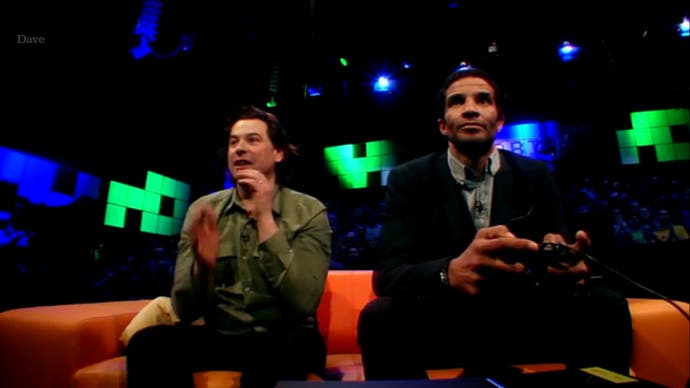
Everybody always remembers GamesMaster when the topic of video game telly comes up. (Ellie Gibson wrote the definitive article on GamesMaster, which is well worth a read.) Since GamesMaster's demise, video game TV shows have come and gone, but none have made it big in the same way. Perhaps until now.
Why haven't there been more video game TV shows in the UK over the years? There are many theories, most of which point to the assertion that it's really really hard to make good video game telly.
Some say watching people play video games isn't interesting, but at a time when millions watch people play Minecraft on YouTube and League of Legends on Twitch, that seems like a silly thing to say. Perhaps it's better to say that watching people play video games doesn't work on telly, because that's not what people watch telly for.
Others say TV companies are frightened of video games. Video games are, when you think about it, the competition. TV executives are battling for increasingly fractured attention spans. And then there's a load of stuff already around online about video games. If it's not on YouTube or Twitch then it is, hopefully, on Eurogamer. Why would video game fans watch a TV show about video games when the internet has them covered? I am unsurprised to learn it took three years to get Go-Bit onto telly. I'm kind of surprised it's on telly at all.
And then there's the suggestion that TV executives, the people whose decision-making determines what we watch, just don't get video games at all. These TV executives, we imagine, perhaps played Sonic and Mario 20 years ago then moved on. Video games, for them, are what they read about in the papers or see on BBC Click or something; Call of Duty, Grand Theft Auto, Minecraft and FIFA. They don't know about No Man's Sky and The Last of Us. They probably know about Pokemon Go, though.
Ellie Gibson remembers having to iron out a few kinks while working on Go 8 Bit for Dave.
"Early on there was a meeting where they were like, right, so here's a script for episode one and there was a bit saying, grab your joypads!
"And I was like, you can't say that. They said, why? I said, because nobody says joypads. It's 2016. Nobody says joypads in the same way nobody says gramophone. So they were like, what do we call them then? Joysticks? I was like, no. Controllers is fine. There were lots of little conversations like that.
"Dara understands the vernacular of gaming. He knows saying waggle your joysticks, nobody wants that.
"We banned early on any talk of, oh nerds and geeks. That was all banned. We were like, no, video games are fun and they're for everybody, and it's fun to play them and watch them and compete, and it's a laugh. And that's that."
Before you grab your pitchforks and march toward your nearest TV channel, it's worth noting that some video game publishers are perhaps guilty of not getting video games, either. And what's worse? A TV executive who's ignorant, or a video game publishing executive who should know better?
The Go 8 Bit production team struggled to get clearance from some video game publishers to use their games on the show, despite the fact it's fronted by one of the most famous comedians in the UK and Ireland, and is on one of the most famous channels we have.
"Video game companies generally tend to be a bit precious about their products and lack a sense of humour," Gibson says. "There's a misunderstanding that people can tolerate something having the piss taken out of it and still consume the product.
"Like, I love playing Pokemon Go, but if I saw a funny thing taking the piss out of Pokemon Go and the people who play it, I'd just think that was funny.
"There was a lot of, but what is it? And, are you going to take the piss out of our games? We can't really say, well no, because we're putting four comedians on the television to talk about your game. There's a lot of fear. It's much easier to say no, you can't do this."
Dara O Briain has his own theory for why there haven't been more video game TV shows. He reckons video games suffer in comparison to other entertainment industries, such as music and movies, because it does not produce what he calls "the ancillary stuff".
"ie photographs of Rita Ora in a bikini," he suggests. "The stuff you can fill a page with, particularly when you need to fill pages cheaply, is supplied by other industries and it isn't supplied by the video game industry.
"It's not like, oh, appearing at the premiere of Far Cry 4 was this glamorous actress in an evening dress. You don't get any of that kind of coverage at all. So there's no glamour, no easy page-filling beauty shots, there's no gossip, there's no cheap intrigue to fill acres of news print about who's feuding with whom.
"All that kind of ancillary stuff that fills column inches and keeps people ticking over on the Kardashians or Taylor Swift, doesn't exist in the video game industry at all. It's just a thing. It's just a product. And the product goes out to the consumer, and the consumer enjoys it."
There are a lot of factors at play, then, which have combined to make video game telly a hard sell. For me, though, the most influential of these factors has to be the rise of YouTube. With millions watching Let's Plays and with PewDiePie enjoying a bigger audience than pretty much any TV show around, haven't video games moved on from TV? Are we not talking about the golden age of people watching stuff about video games, because more people are doing it than ever, they're just not doing it on TV?
Ellie Gibson rejects the notion that YouTube killed off any chance video games had of making a go of it on telly. Rather, she says, the success of gaming on YouTube is "proof there is an audience for it".
"The first thing to understand is YouTube is its own thing, and it's a specific audience," she says. "People like the roughness of it and the way it's cut. There's no point trying to copy that on telly because it won't work.
"I'll bring it back to GamesMaster. One of the people I interviewed said, we knew from the start not to try and be cool, because if you try and make video games cool, you will fail. It's an impossible aim. So the best they tried to do, and the best we're trying to do is to be funny. That's a really good way in of saying, this is not just us playing games, and it's not just us being comedians. Let's bring them together. Let's look at games, and let's celebrate them and enjoy the fun of them, and laugh at them and laugh at each other. That's the trick of it."
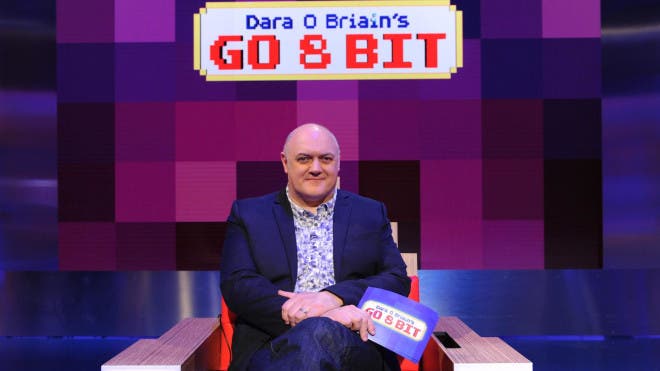
People go to YouTube for video game videos for all sorts of reasons. They go there for information, they go there to learn how to be better at playing video games, they go there for entertainment, and they go there to watch their favourite YouTuber do their thing, whatever it happens to be.
Go 8 Bit is a panel show that revolves around video games. At its core it's classic TV, a sort of Mock the Week but with people playing video games every now and then rather than doing a bit of stand-up. This kind of production - with a fancy set, celebrities who are paid four figures and a superstar comedian fronting the whole thing - the economics of it simply wouldn't work on YouTube.
"You need a lot of money to pay these comedians and Dara and obviously I'm getting a million pounds an hour," Gibson says. "I've got a nanny. You wouldn't believe how expensive nannies are. We'd better get a series two otherwise umbrella up the chimney. She's gone.
"We built that huge set. One episode has a Cher lookalike.
"Over the years I've heard many people say, oh, we're going to make Top Gear for games, and it never happens. The point of the show is to make you laugh and get you engaged with the competitions. Would that work on YouTube?"
Gibson insists there's room for video games on YouTube and video games on telly. Not everyone uses YouTube, she insists. And yet video game telly has struggled. It continues to struggle.
Videogame Nation was cancelled after Challenge TV decided to focus entirely on game shows. Ginx, which produced VGN for Challenge, couldn't find another home for the programme, either on another channel or its own channel. Ginx has since switched focus itself to eSports, broadcasting Overwatch and Call of Duty tournaments.
It doesn't sound like YouTube had much of an impact on VGN's cancellation at all. Ginx boss Michiel Bakker puts it down to a client having a change of mind. But when I ask him if there's a future for magazine-style TV shows about video games, the kind that reviews games, that talks passionately about them in a language enthusiasts understand best, he says, well, no.
"Simply reviewing and previewing video games using a lot of in-game footage and a voiceover telling a story about that game, that sort of format doesn't cut it any more," Bakker says. "That is true. You need to add bigger production values and a story.
"Eurogamer does a great job of these in-depth reviews of a game. You need to really add something on television. That's more the human story, and that could also be humour as the Go 8 Bit guys are doing.
"Straight video game reviews and previews and using in-game footage and writing a beautiful, well-written piece of content about it, you guys do that well enough. TV in that form didn't add enough.
"What is clear is TV needs to do what we are now doing, and what Go 8 Bit is doing, which is add that production value and tell a story, be funny and create a reason for people to come to it."
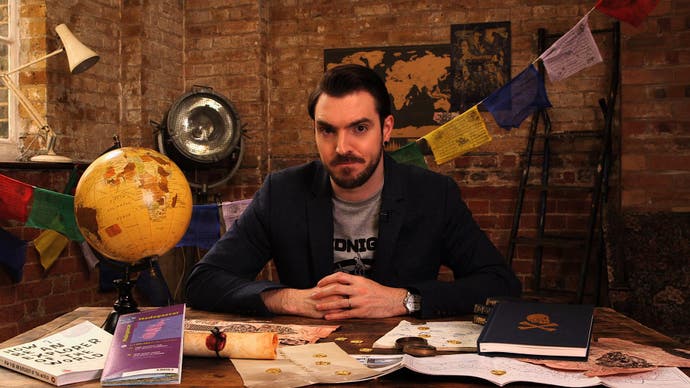
Presenter Dan Maher worked on VGN for four seasons. He's proud of what the production team achieved with the budget it had at its disposal, and believes passionately that a show like it can succeed even in the face of YouTube.
"There's still room for a show that deals with video games in an intelligent and mature fashion, that speaks to people who don't want to watch three hours of someone screaming through Five Nights at Freddy's," Maher says.
"They want to have a nice, digestible half hour a week where they can indulge in their hobby and listen to people who know what they're talking about.
"TV is still a space where you can expect a degree of professionalism to the production. People still crave a well-produced block of finely honed programming over being forced to dig through the wall of noise you're faced with when you go onto YouTube and Twitch."
Ginx TV's eSports push is interesting. Here we have a 24-hour television channel, that's available on Sky as well as Virgin Media, about people who play video games competitively. Most people in the industry believe eSports' home is online, on Twitch mainly. Not many people think eSports has a home on telly. But Ginx does.
"This is the challenge," Bakker admits. "Our view is it's about storytelling. It's about creating documentaries and supporting programming around eSports matches to package these events and add an aspect to it that gives people a reason to watch it on our channel.
"It should be represented in our production values and our access to people and the care we take in creating that surrounding programming.
"If you look at online streams of eSports, it's very specific. It's very one on one. It's not bringing people in. It's not collective. It's quite a singular activity. We look at it through a different lens."
Is eSports the future of video game TV? Bakker says it's early days for Ginx's eSports push and won't be budged on specifics. "We're an established video game TV channel, but we're a new kid on the block in the eSports arena," he says. "I know we have to earn our stripes and we have to deliver an engaging and sufficiently different experience so people have a reason to watch our channel."
I'm not surprised when Bakker says he won't give me hard numbers - or the "overnights", in TV executive speak - on Ginx TV viewers. All he'll say is he's "pleased" with the numbers he's seeing.
There's much work to do. I am surprised to learn Ginx TV eSports does not broadcast League of Legends tournaments. That is, Ginx TV, a 24-hour channel devoted to eSports, does not cover the biggest eSport in the world. It turns out Ginx TV doesn't have permission from Riot to broadcast League of Legends tournaments yet. ("We are on a gradual path of developing our relationship to become comfortable with one another on coverage on their events" Bakker says.) So, Ginx presenters talk about the game instead.
A cursory glance at the comments on Eurogamer's story about the announcement of Go 8 Bit shows there's a degree of scepticism about the show. This has not gone unnoticed.
"Some of the people in the production office - I was in the office when the story went up - some of the people in the production office who haven't worked in game journalism were quite shocked," Gibson reveals.
"Not offended, but kind of mystified. Like, why is there all this hate? Why have people decided they don't like it when they haven't even seen a trailer? And I was like, welcome to video games!
"I'm fully prepared that some people will hate it. You can see that because some people do hate it and they haven't seen it. You can try and analyse it, but you can't change it."
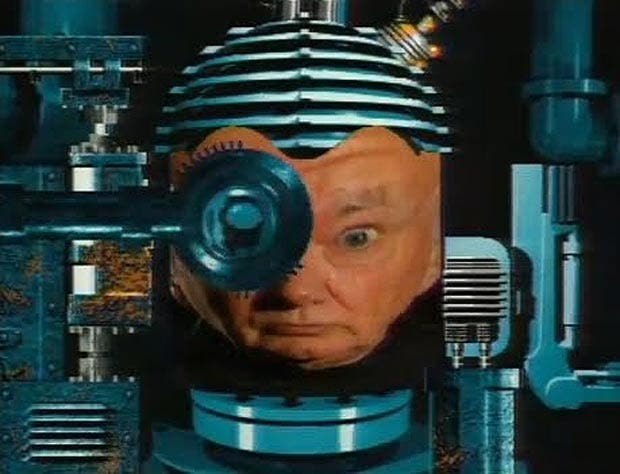
If there is a desire for some GamesMaster spiritual successor, or a return to the perceived glory days of video game telly in the UK, it seems unlikely to be fulfilled. Most doubt we'll ever see a show like GamesMaster on mainstream telly ever again. "No, frankly," Maher says.
"But there could be room in a post-watershed slot somewhere on a secondary terrestrial channel, BBC4 and the MoreFours of this world, or even Sky Arts, that might be willing to entertain it, even if it's an experiment."
In truth, the launch of Go 8 Bit on Dave is the most mainstream video game TV show since GamesMaster. But will it herald a deluge of video game telly? Probably not. But TV executives will no doubt watch its performance with interest. If it pulls in the numbers, other channels may follow Dave's lead and give video games a chance.
All most people want, comments suggest, is a good video game TV show, but what is a good video game TV show? What is good to one gamer is awful to another.
What's clear is Dara whether or not Go 8 Bit does the business for Dave, Dara O Briain and Ellie Gibson would love to do another series.
"Well, obviously, to quote Alan Partridge, do we get a second series?" Gibson wonders. "If we do get a second series, will I be in the second series? I don't know. They might replace me with Cat Deeley."
